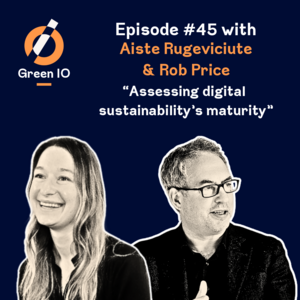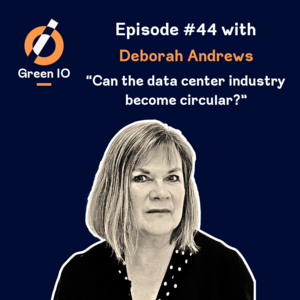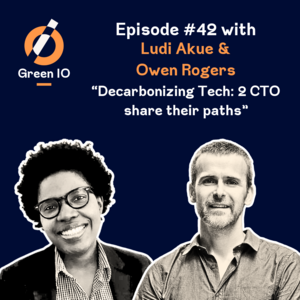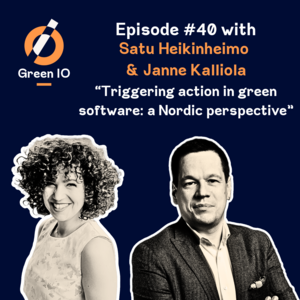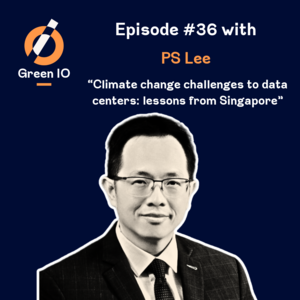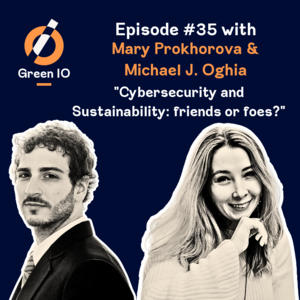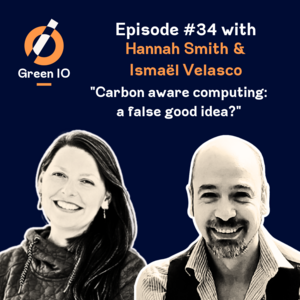#28 Rage against the AI with Anastasis Stamatis, Lou Welgryn and Theo Alves Da Costa
Update: 2023-11-21
Description
🤯 AI is all the rage at the moment but what about its impact?
🌱 Especially its environmental cost?
🛑 Does it mean we should stop leveraging this tool?
🏃 Can we extract ourselves from this rat race?
AI comes with many questions and this episode comes with a clear angle to debate it: how do data experts specialized in impact business such as Lou Welgryn and Theo Alves Da Costa - the 2 founders of the NGO Data for Good - and Anastasis Stamatis - the founder of Dataphoria - answer these questions?
It’s not that much about the training, go for a factor 10, … A lot of counterintuitive answers and great food for thoughts!
⚠️ Breaking news ⚠️
📣 Green IO launches its first on site Green IO conference in Paris, December 8th. Join us to get the latest insights on Digital Sustainability with Aurore Stéphant, Perrine Tanguy, Tristan Nitot, Julia Meyer, Theo Alves Da Costa, and many more! Get also feedback from all the teams involved in the 2023 Sustainable Digital Challenge: Allianz, Axa, BlaBlaCar, BNP Paribas Cardif, Ekwateur, Evaneos, Groupama, INSEE, Leboncoin, Norauto, SNCF!
And it's free for our listeners! Register here with the voucher GREENIOVIP. We're looking forward to seeing hundreds of you there 😍.
❤️ Subscribe, follow, like, ... stay connected the way you want to never miss an episode!
📧 Once a month, we deliver carefully curated news on digital sustainability packed with exclusive Green IO contents in your mailbox, subscribe to the Green IO newsletter here.
🫴 Green IO is a free and independent podcast! And so we need your help to keep it that way by supporting us on Tipeee here.
Learn more about our guest and connect
- Anastasis's LinkedIn
- Lou's LinkedIn
- Theo's LinkedIn
- Gaël's LinkedIn
- Gaël's website
- Green IO website
- Green IO newsletter
📧 You can also send us an email at greenio@duez.com to share your feedback and suggest future guests or topics.
Anastasis', Lou's and Theo's sources and other references mentioned in this episode
- Climate Q&A
- Data for Good
- Dataphoria
- Hugging Face and its models Zephyr 7b-beta and Bloom
- Code Carbon
- Andrew Ng
- Sasha Luccioni and her paper “Counting Carbon: A Survey of Factors Influencing the Emissions of Machine Learning”
- Pyronear, the NGO using AI to to detect forest fire
- Quota climat
- Green IO episode 11 with Elin Hauge and Heloise Nonne
- Climate Fresk
Transcript
[00:00 ] Gaël : Hello everyone. Welcome to Green IO, the podcast for responsible technologists building a greener Digital world one byte at a time.
Our guests from across the globe, share insights, tools and alternative approaches, enabling people within the tech sector and beyond to boost digital sustainability.
[00:33 ] Gaël: You might have heard about artificial intelligence last month. Yeah, sorry about the joke. But you might also have heard about the rising concern about the environmental footprint about artificial intelligence and data groups. Actually, I recorded a full episode with Jerry McGovern and Katie Singer in January about what they call data tsunami. And since then, we've seen new studies about the water consumption of chat GPT, about the electricity consumption, training and requesting these artificial intelligence models, that have started to raise concerns about the sustainability of these new technologies. But on the other end, I'm bombarded with articles, posts and discussions with peers and clients about the expected benefits of AI for humankind. So I reckon this question is on a lot of tech practitioners’ minds today: how to leverage AI and data to regenerate the planet in our societies rather than destroying them. And to answer it, I decided to ask people I could trust, to tell more about data for good. For real, and by real, I mean, without overlooking all the impacts of using AI including the negative ones. And believe me, Lou, Théo and Anastasis are to be trusted.
Lou and Théo founded Data for Good in France five years ago. Today, this community gathers more than 3000 data scientists and data engineers doing pro bono work for NGOs and nonprofits. And Data for Good has been making headlines in early November with their job on 425 climate bombs worldwide, and which companies and banks are supporting them. But that's something Data for Good has been familiar with. Just last year, Lou was listed among the 100 thought leaders who give meaning to technology in France, (kudo) and was getting attention with the ClimateQA, using Chat GPT, but trained only with IPCC reports. And it was important to me to have another point of view than a French one. And so for this episode, Anastasis Stamatis was a perfect match. Thanks to the Climate Fresk network, I discovered the founder of Dataphoria in Greece and his amazing track record in the impact business sector, most of them powered by AI. So welcome, Lou, Theo and Anastasis. Thanks a lot for joining Green IO today. That's our third attempt to get a recording, but this one will be the good one.
[03:10 ] Théo: Hello everyone.
[03:11 ] Lou: Well, hi.
[03:12 ] Anastasis: Hi, Gaël. Thanks for having us.
[03:13 ] Gaël: You're welcome. Before we jump into both the bright and dark side of AI, I would like to ask a very simple question but a very tricky one. Where are we with artificial intelligence in the world? What's really the spread of AI in both tech companies, but in regular companies, government, etcetera. And is the technology moving that fast? How much is hype, and how much is really big acceleration?
[03:46 ] Théo: It's an interesting question, because it's been a year since Chat GPT has come out, and it's changed a bit how people see AI. And with it, at Data for Good, we created a white paper on generative AI, and we actually discovered that a lot of people in the general public didn't really know the history of AI and there are still a lot of misconceptions about the topic and a lot of people, for example, don't know that AI actually has been around for more than eighty years, and has had a lot of waves and evolutions over the years, and has already enabled us to do lots of stuff. For example, I always say when we explain about the topic, that Google search has been using the Transformers technology (which is in chat GPT), for more than seven years in production. So people are using AI every day in their Google search. And this has been a constant evolution for the past eighty years, even if there has been some increasing pace at some points in history. But still there is something new about today, which is for me, the general public’s adoption of these technologies, which has actually struck a lot of people by surprise, by the fact that it was not something that different. Of course, we can do a lot of things a lot better since we have access to generative AI technologies. But still, it was only the fact that 200 million people now use Chat GPT every day that signaled a big change, and people now were able to actually test it and that made them even want to learn more about the topic. So for me this is actually not a technological outbreak or like a complete shift in what was feasible. But more something that now is accessible and people know that it's not something obscure, and that they can use it. And with it, there is a question of the exponential. That's when you talk about environmental issues. Every time there is an exponential like this, there is a question. So there is a part of Ai that is in consta
Comments
Top Podcasts
The Best New Comedy Podcast Right Now – June 2024The Best News Podcast Right Now – June 2024The Best New Business Podcast Right Now – June 2024The Best New Sports Podcast Right Now – June 2024The Best New True Crime Podcast Right Now – June 2024The Best New Joe Rogan Experience Podcast Right Now – June 20The Best New Dan Bongino Show Podcast Right Now – June 20The Best New Mark Levin Podcast – June 2024
In Channel


